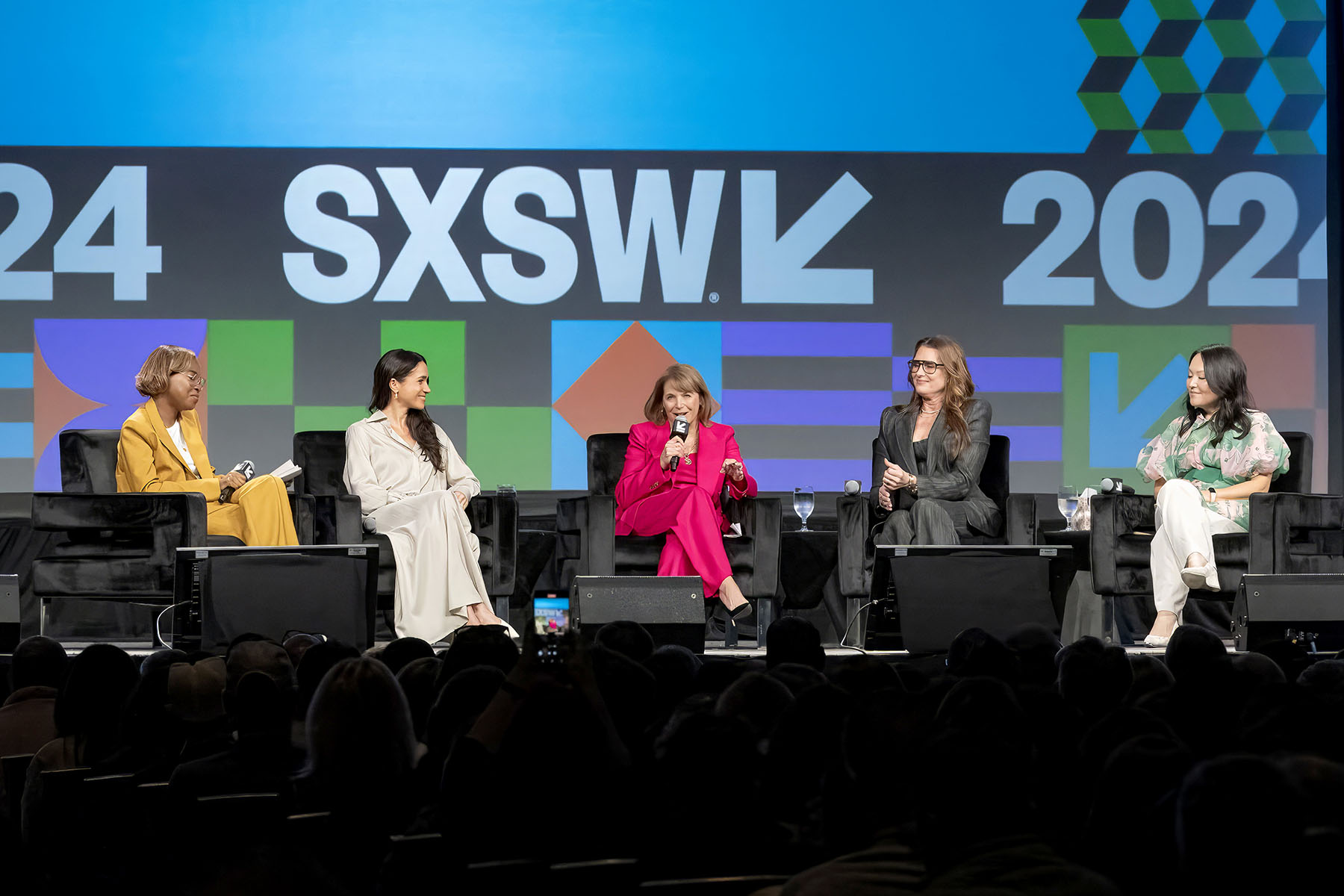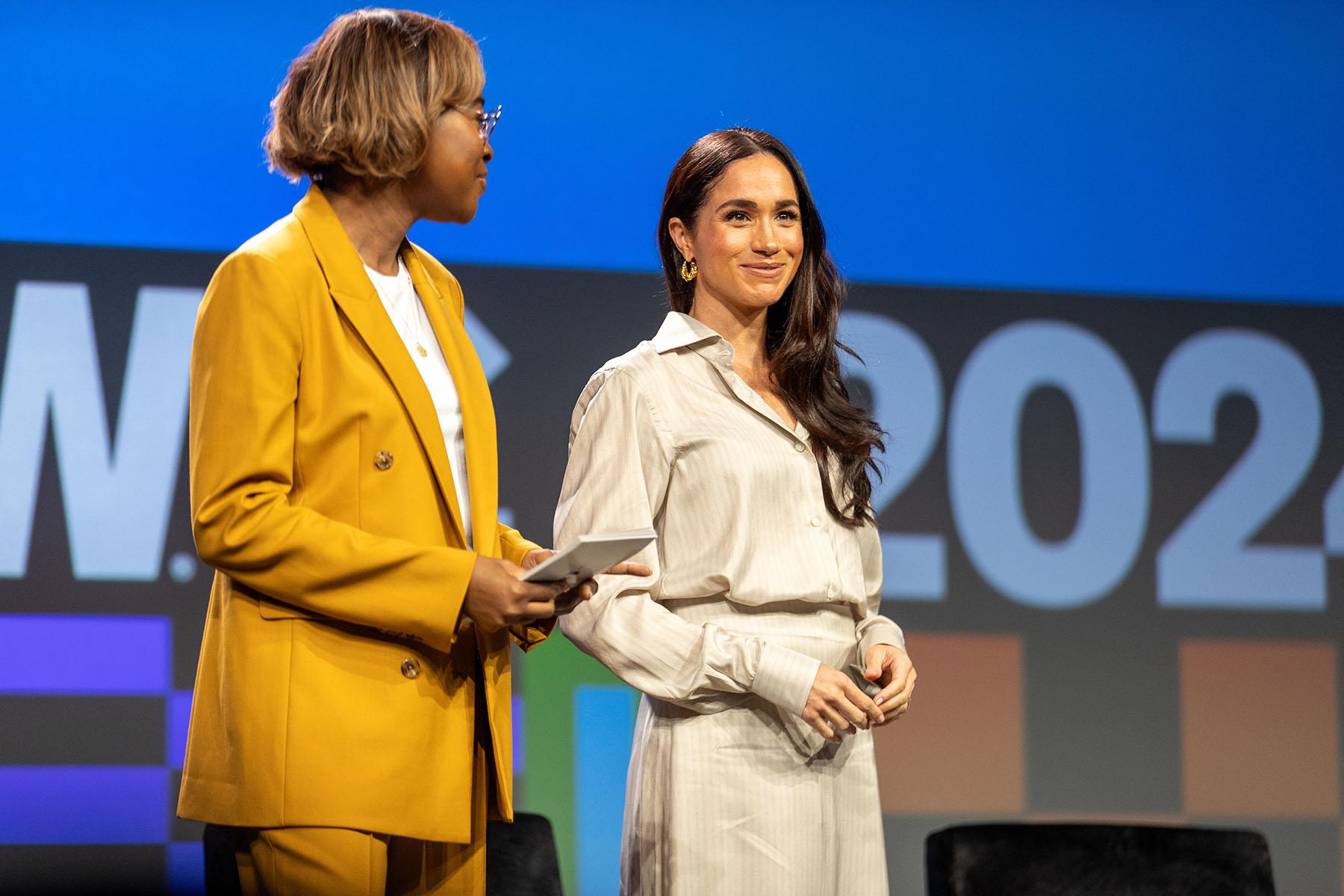“Representation still falls short, particularly for women of color and for mothers,” The 19th’s editor-at-large Errin Haines said at an International Women’s Day Panel at South by Southwest (SXSW) in Austin, Texas.
The keynote discussion between Meghan, Duchess of Sussex; Katie Couric; Brooke Shields; and Nancy Wang Yuen was co-hosted by The 19th News in partnership with The Archewell foundation — the nonprofit founded by Prince Harry and Meghan — was moderated by Haines.
The panel was introduced by Jann Baskett, the first woman co-president and chief brand officer of SXSW, and brought attention specifically to representation in the industries of media and entertainment.
A new report was released Thursday by the Geena Davis Institute and the advocacy organization Moms First, supported by The Archewell foundation. Among the findings were that on television “moms are represented as thin, young, White and not really working outside the home, which is a patriarchal fantasy,” Wang Yuen told Haines.
Nine out of 10 clear breadwinners on TVs are dads, and the realities of both child care and home maintenance are rarely reflected. “One of the [Geena Davis Institute on Gender in Media] findings said that working moms are paid 62 cents to the dollar for what working dads are,” Meghan told Haines. “And it’s almost feeling punitive, at a certain point, when you’re a mom and you’re juggling so much and caring so much and you want to be supported in the best way possible.”
“The U.S., out of all the wealthy countries, ranks second to last when it comes to child care and parental leave policies,” Wang Yuen added. “I remember when I was in grad school, that’s when I had my first baby, and I found it harder to secure affordable and high-quality child care than to actually complete my PhD.”
Furthermore, financial challenges like the “motherhood penalty” women face in lost wages during their childbearing years and a dearth of paid family leave are experienced differently across race, class, ethnicity and other “crucial intersections,” according to the report. The same can be said for mental health challenges. “The key thing that I think needs to be focused on in terms of equity is that it’s not a zero-sum game,” Meghan said. “Just because someone else has the same advantage that you do, doesn’t mean that you’re losing anything.”
As the conversation turned toward being a woman at work, Katie Couric — the first woman to solo anchor the CBS Evening News, and also managing editor of the broadcast for the five years she was there — remembers her early days at the network. “I’m not gonna lie, it was really challenging,” Couric told Haines. “I remember after my first night anchoring the news, it was really exciting, and the next day a media critic said, ‘Why was she wearing a white jacket after Labor Day?’”
She continued: “Tom Shales, who really wrote nice things about me, said ‘The way that she buttoned her jacket, she looked chubby.’ Keith Olbermann said, ‘She looked like she had been Botoxed.’ A feminist who shall not be named said, ‘I couldn’t really evaluate her performance because her makeup was so bad.’ And somebody else — Dan Rather, who shall be named — said I was dumbing down and tarting up the news.”

The conversation went on to address who is on top when it comes to power. “I looked at a picture at all of the heads of the major streamers [networks] and it’s five white guys,” said Couric. “I think 20 percent of editors of the most popular online publications are women, and when it comes to podcasting women are 50 percent of listeners but men are 79 percent of hosts.”
Meghan called out social media and other large platforms, saying, “There are a lot of women that are at the highest level, executive level, who are great champions of women, who are great philanthropists, and they are working in these spaces and yet they’re allowing this behavior [of trolling and cyberbullying] to run rampant.”
It’s not all doom and gloom, as Haines noted as the conversation came to a close. The panel also touched on how American society has made progress on these matters. Couric noted that “the presidents of the news divisions at ABC, NBC, CBS, MSNBC, and even Fox are all women,” — only two of whom are women of color — and Shields expressed that what she’s noticing now in Hollywood “is that there are more voices who are surrounded by other women and other supportive voices. And together as a collective we can move it forward and have it not be angry, but have it be progressive.”
Shields added, “We’ve gotta make sure that we look right behind us, too, and bring up these young women who want to cancel out that messaging [of anger and vitriol].”
When asked about who is doing representation really well, Wang Yuen was quick to mention Ava DuVernay and the independent entertainment company A24, citing their work with authentic storytellers and how they’ve done right by the communities they aim to represent. “We actually resonate when we see someone’s truth,” she said. “It resonates with something true in ourselves even if we don’t understand that completely, and we want to know more.”
In addition to calling out Bela Bajaria — the Chief Content Officer at Netflix who is also a woman of color — for “bringing in the content that reflects our stories in a holistic and real way,” Meghan talked about the importance of speaking up, even when coming from a position of less power. “If you know that there’s something wrong, and you’re using your voice to advocate in the direction of what is right, that can really land and resonate and make huge change for a lot of people,” she said, recounting how she had a P&G commercial changed when she was only 11 years old. “So, your voice is not small, It just needs to be heard.”






